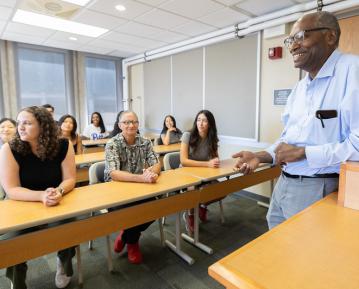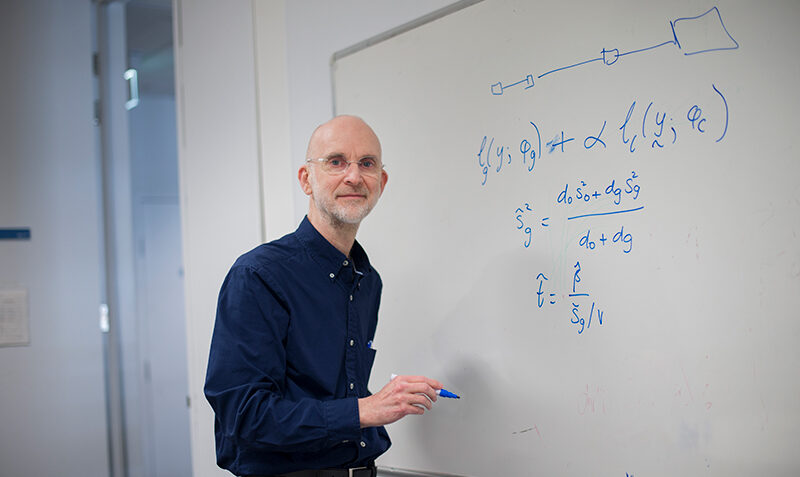Getting My Bioinformatics Tutor To Work
Getting My Bioinformatics Tutor To Work
Blog Article
Bioinformatics Tutor Can Be Fun For Anyone
Table of ContentsThe Main Principles Of Bioinformatics Tutor Indicators on Bioinformatics Tutor You Need To KnowThe Best Strategy To Use For Bioinformatics TutorIndicators on Bioinformatics Tutor You Need To KnowSome Known Facts About Bioinformatics Tutor.
Of the total individuals associated with the training, 80% were trainees from public higher education establishments, while the continuing to be 20% originated from personal establishments. To receive a certificate of participation, pupils were needed to participate in a minimum of 90% of the total training hours. As a result of this requirement, a remarkable 95% of the individuals efficiently acquired their certifications, having not just met the minimum participation standards however also completed all assigned tasks throughout the training.Throughout the height of the COVID-19 pandemic, especially in between June and August 2020, the job group was charged with organizing specialized training in bioinformatics. This training was specifically intended at students from the research study team Core for Study in Applied Computing at the Federal College of Pará (UFRA) The adaptation to remote learning platforms as a result of the pandemic developed a possibility to check out new training methods and digital tools that boosted both reach and efficiency.
This program was developed to give an obtainable yet detailed summary of Artificial Knowledge methods, specifically as applied in bioinformatics (Bioinformatics Tutor). This virtual style enabled engagement from students throughout Brazil, many of whom could not have had the chance to participate in in-person sessions.
Getting My Bioinformatics Tutor To Work
A significant feature of this program was its focus on hands-on discovering. Approximately 50% of the overall training hours were dedicated to functional activities where students constructed intelligent designs and applications in a variety of scientific domain names, including genes, molecular biology, and ecological information evaluation. Extensively used tools and structures such as Spyder, Google Colab, Jupyter Notebooks, and Orange were integrated into the coursework. These platforms allowed trainees to engage in real-time data adjustment, design training, and formula trial and error.
The course drew in 80 individuals in overall. Sixty of them were affiliated with different greater education and learning establishments in the state of Pará, while the remaining twenty came from organizations situated in five other Brazilian states. This broad geographical representation highlighted the national interest in bioinformatics and the expanding need for specialized abilities around. By introducing Artificial Intelligence in a useful and appropriate context, the campaign offered to link the space between concept and real-world application, supplying trainees with a solid structure for future research study or employment in the field.
The training effort formed component of a broader academic outreach initiative understood as the Bioinformatics on the Roadway job. This project has, for many years, introduced loads of trainees to the globe of bioinformatics and computational biology. The events held under this umbrella effort have taken location throughout multiple areas and years, as summarized in Table 1 (Listing of occasions, locations, years, and overall numbers of trainees and teachers)
One of one of the most remarkable results of the Bioinformatics on the Roadway effort has actually been its payment to the growth of decentralized research study groups. Numerous of these groups, at first combined by their participation in training events, have actually since gone on to create independent clinical study in collaboration with regional academic establishments. The training not just fostered scientific thinking within the context of bioinformatics however additionally sparked collaborative connections that prolonged past the training environment. These partnerships have actually brought about enhanced regional clinical productivity and contributed meaningfully to the growth of the more comprehensive bioinformatics community in Brazil.
How Bioinformatics Tutor can Save You Time, Stress, and Money.
The exact same group, excluding IH and RR, additionally acted as tutors for the useful training components. Funding for the job was provided via the grant 88887.200562/ 2018-00 from CAPES.
The Federal College of Pará's Office of Research (PROPESP/UFPA) additionally supplied monetary assistance, particularly for the manufacturing of the final this hyperlink manuscript. The writers declare no industrial or financial conflicts of passion that might have affected the research. All opinions and analyses expressed in this article are only those of the authors and do not always reflect those of their corresponding institutions, the author, editors, or customers involved in the magazine process.

Bioinformatics Tutor Things To Know Before You Buy
From an instructional viewpoint, the mentor technique utilized in the training was deliberately interactive. Classes were conducted in a manner that encouraged pupil engagement and conversation, going beyond rote memorization to explore just how concepts are established, applied in day-to-day live, and examined in scholastic settings. The instructional philosophy concentrated on supporting both strong and battling pupils, supplying personalized support, and structure confidence through continual mentorship and persistence.

Each group, containing around 36 participants, was supported by 3 coaches-- the majority of whom were postdoctoral researchers with customized proficiency. These mentors not just assisted develop the team jobs however also promoted their execution, ensuring that each study concern was both relevant and suitably difficult. The objective was to supply a biologically practical context that participants can check out through flexible goals and accessibility to curated datasets.
For extra insights right into the method and outcomes of this project-based knowing approach, viewers are guided to S1 Text, which consists of comprehensive summaries of the instructional framework, analysis methods, and task styles utilized in the training sessions.
Facts About Bioinformatics Tutor Uncovered
Of the overall individuals entailed in the training, 80% were students from public higher education and learning establishments, while the remaining 20% came from personal organizations. To certify for a certification of engagement, pupils were required to attend at least 90% of the total training hours. Significantly, past the pupils that enlisted in the training sessions, 7 knowledgeable trainers got involved in supplying the training courses, while 3 committed research professors coordinated the overall training process. Roughly 50% of the overall training hours were devoted to functional tasks where pupils built intelligent versions and applications in an array of clinical domain names, consisting of genetics, molecular biology, and environmental data evaluation. The training not just cultivated clinical thinking within the context of bioinformatics but also sparked collaborative partnerships that expanded past the training try this web-site atmosphere.
Report this page